“Juvenile Justice” (소년 심판)
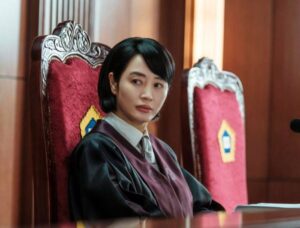
There has been much debate in South Korea about how to punish and rehabilitate underage criminals. “Juvenile Justice” deals with these issues in a taut manner, using the law to mete out judicial revenge.
Journalist, Author & Syndicated Columnist

There has been much debate in South Korea about how to punish and rehabilitate underage criminals. “Juvenile Justice” deals with these issues in a taut manner, using the law to mete out judicial revenge.

“The Hymn of Death” is a bittersweet three-hour mini-series that tells the real-life story of Yum Sim-Deok — Joseon’s first soprano — and Kim Yoo-Jin, a renowned writer and playwright. Set during the period when Korea was under Japanese rule, the tragic story is familiar to many Koreans.

During this pandemic when most of us can’t travel and are stuck at home, we can live vicariously through the delicious adventures of Rain and Noh Hong-chul in “The Hungry and the Hairy.”

Based on Gong Ji-young’s 2009 novel, “Silenced” is a brutal look at the systematic torture of children at a facility for the hearing impaired. Though Gong’s book is fictional, the stories she tells are based on the decades of real-life abuse that handicapped students endured at the Gwangju Inhwa School for the Deaf.

Based on the 2016 K-drama, “Cheese in the Trap” — which was based on the webtoon of the same name — this film adaptation is a good primer, but it’s lacking in telling the characters’ full stories.
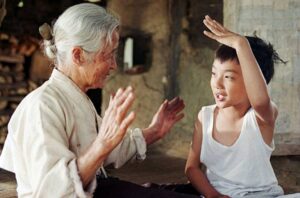
“The Way Home” is a bittersweet film about a young Seoul boy who is forced to spend the summer with his grandmother, who lives in the countryside. It’s not a quaint rural area that rich folks like to vacation in. Rather, it’s a small village where the bus comes on a irregular schedule and an angry cow chases little children.

“Sisyphus: The Myth” has an intriguing premise, in which an inventor creates a time machine. And as with many time travel stories, you have to suspend your belief in reality to enjoy this production.
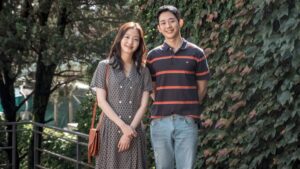
Set in the 1990s, “Tune in for Love” is a beautiful slice-of-life film focused on a young couple who meet as teenagers, lose touch, and reunite on and off throughout their twenties.

“Inspector Koo” starts off strong, with a whip-smart teenage serial killer manipulating her victims, teachers and the police. She is as much a sociopath as a psychopath, which is explained away during a backstory that involves childhood trauma.

Director Yeon Sang-Ha (“Train to Busan”) adapted “Hellbound” from his own webtoon of the same name. He makes it clear that cults are the true sinners, which manipulate people’s lives with fear. And that hell isn’t necessarily a place foreign to us, because it’s where we may already be living.

“Hometown Cha-Cha-Cha” is one of those slow-moving K-dramas that makes viewers wish they had the same kind of relationship as the characters do — not just with love interests, but with their friends.

You know how in most action series, there is that one guy who can fight a team of gangsters, get stabbed and bounce back into action in no time? In “My Name,” that guy is a kickass woman.

The superb “D.P.” is not an easy series to watch. While not as gory as “Squid Game,” it’s more disturbing in many ways, because it deals with South Korea’s real-life mandatory military duty — which requires every able-bodied Korean man to enlist for approximately two years.

“Mine” is a women-centric K-drama in which the worst actions have been created by men. Their immorality serves as a cause and effect for a chaebol family’s misery.
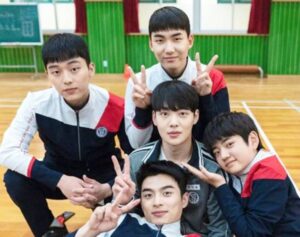
“Racket Boys” is a sweet series centering around a teenager, who’s forced to quit baseball when his father moves them from Seoul to the countryside. Disappointed and bitter, Hae-Kang begrudgingly joins the badminton team — which his father coaches — on the condition that if the team wins a medal, his dad will get them Wi-Fi at their house.

As with Choi Jin-Hyuk’s previous police procedural, “Tunnel,” there are some convoluted plot issues that drag down “Rugal.” Choi is handsome and charismatic, but he can only do so much with so-so dialogue.

“Move to Heaven” is a beautiful and at times brutal series that tells so many touching stories. One of the most important aspects was in how the series showed respect for the dead, even when the supposed loved ones of the deceased don’t seem to care.

“Space Sweepers” has a lot of things going for it — great acting, cinematography, special effects. But once you’re done oohing and ahhing at the visual onslaught, it’ll sink in that what the film lacks is a cohesive storyline.
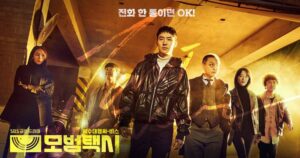
“Taxi Driver” is a thrilling series in the vein of “The Equalizer,” “Profiler” and “The Pretender.” Rainbow Taxi Service driver by day and justice seeker by (mostly) night, Do-Gi and his team are funded by a philanthropist whose parents were murdered decades ago. The goal is to rehabilitate them, but what it all boils down to is revenge.
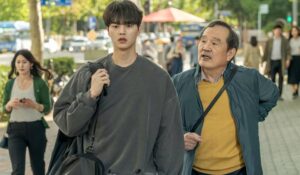
For septuagenarian Shim Deok-Chul, his unfulfilled dream is ballet. As a child, he had wanted to take lessons, but his father stopped him. There was the lack of money. But there was (and still is) also the prejudice against men who participated in the artform. For many close-minded people who fear the unknown, dancing isn’t a masculine hobby to take up.